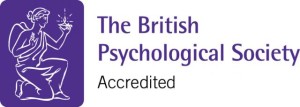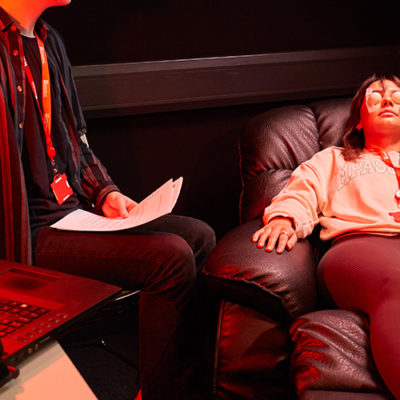
Lauren McAllister
Senior Lecturer in Psychology
Psychology (Counselling) BSc (Hons)
DiscoverGet in touch with us as we may be able to offer you a place for September 2024 through Clearing.
UCAS Code
BC98
Level
UndergraduateUG
BSc (Hons)Duration
Full Time: 3 Years
Foundation: 4 Years
Part Time: 4 - 6 Years
Starting
September
BBC at A Level
DDM at BTEC
Fees UK 24/25
Full Time: £9,250
Part Time: £1,540 per 20 credit module
Integrated Foundation Year: £9,250
Fees International 24/25
Full Time: £15,200
Integrated Foundation Year: £15,200
Location
For questions regarding study and admissions please contact us:
study@northampton.ac.uk
0300 303 2772
The University of Northampton’s psychology with counselling course is designed specifically for those interested in pursuing a career in counselling or clinical psychology. It is one of only a handful of national psychology counselling courses tailored for professions where interactive skills are essential.
Our Psychology and Counselling degree will introduce you to the central concepts of both psychology and counselling. You will explore the subjects in great depth, according to your interests. You will have the opportunity to study areas as diverse as positive psychology, parapsychology and neuroscience of mind.
Our Psychology and Counselling course is accredited by the British Psychological Society (BPS). Upon completion of the degree in psychology and counselling with a minimum of a second class honours in your degree, you will be eligible for the Graduate Basis for Chartered membership. This is the first step towards becoming a Chartered Psychologist.

Updated 03/07/2024
This degree in psychology and counselling has been designed to contribute towards achieving the following United Nations Sustainable Development Goal: SDG3 Good Health and Wellbeing.
This counselling and psychology degree is made up of psychological theory, counselling skills and practice, and personal reflections and development.
Throughout the psychology with counselling degree, you will have an opportunity to develop your understanding of the key theories and concepts in psychology and counselling. You will learn basic counselling skills and gain an understanding of the professional context of counselling work. The applied nature of counselling psychology will be emphasised throughout the programme.
In addition to a focus on counselling concepts, issues and skills, this course will allow you to analyse and understand human behaviour, thought and emotions, from many different psychological perspectives. If you are looking to become a counsellor then this course provides you with a basis for professional level training.
If you are studying this psychology and counselling course full-time you will take 120 credits each academic year. You will study a mix of core subjects and can choose from a range of modules that reflect your interests. At each level, you will take a core module in Counselling combining three key elements:
It is important to note that this is primarily an academic course rather than a professional training course. Upon completion of this course, you will not be immediately qualified as a counsellor or counselling psychologist. However, on successful completion of the psychology and counselling degree, with a 2:2 or above, you should have the knowledge, skills and experience to enable you to pursue professional training in counselling or counselling/clinical psychology at postgraduate level.
Please note the modules shown here relate to the academic year 24/25. The modules relating to the academic year 25/26 will be available from June 2025.
The core module in stage one ‘Introduction to Counselling’, explores key concepts and research approaches in psychology counselling. This module will develop your awareness of different counselling settings and your presentation skills. You are given an excellent grounding in counselling and psychology that you will continue to build upon throughout the course.
Stage two aims to provide you with a thorough grounding in the main theoretical models used in counselling (person-centred, CBT and psychodynamic). It also provides an opportunity to develop your counselling skills and awareness of the therapeutic process through theory, group work and practice with your peers.
You will also have the option of studying either a module on the psychology of wellbeing or taking a work-based placement: The Psychology of Learning and Teaching in Educational Settings. Please note that if you do select this work-based placement module then a Disclosure and Barring Service (DBS) check will be required.
In stage three, you will undertake a module in counselling psychology theory and counselling skills which will introduce you to a range of issues worked with by counsellors. The knowledge and skills gained will be applicable in a range of therapeutic professions. You will also undertake an empirical dissertation, under the guidance of a psychology or counselling lecturer with particular expertise in your chosen area. You will immerse yourself in a topic of your choosing, subject to staff and ethical approval, and exercise the research skills you have acquired through the course.
A typical offer for BSc (Hons) Psychology (Counselling) would be:
We welcome applications from students with a mix of A levels and BTEC/Cambridge Technical qualifications.
In addition for this psychology with counselling degree, you will be expected to have achieved GCSE Maths at Grade C/4 or above. Domestic equivalencies are not accepted, apart from Access applicants who must take 12 credits of Maths Level 2 or 6 credits of Maths Level 3 as part of their Access course. International equivalencies will be reviewed on application.
The standard entry requirements for the Integrated Foundation Year on psychology counselling courses are:
We welcome applications from students with a mix of A levels and BTEC/Cambridge Technical qualifications.
If you would like more information on how to make an application as a Home or EU student, please visit our How to Apply page.
If you are an International student and would like more information on how to make an application, please visit our How to Apply page.
All International and EU students applying for a psychology and counselling course with us must meet the following minimum English language requirements:
For information regarding English language requirements at the University, please see our IELTS page.
Fees quoted for this degree in psychology and counselling relate to study in the Academic Year 24/25 only. They may be subject to inflationary increases in future years.
Fees quoted for this degree in psychology and counselling relate to study in the Academic Year 23/24 only. They may be subject to inflationary increases in future years.
Costs associated with placements such as travel may be incurred throughout your studies depending on where you are based.
For information on the scholarships available to you, please see our scholarships page.
For more information about possible funding options, please visit our Fees and Funding pages.
At the University of Northampton, everything we do, from funded trips to paid internships, is to give you everything you need to make a difference when you leave.
If you join our full-time Psychology in Counselling degree at Northampton, you will receive a laptop when your course begins*. The laptops are built to a bespoke custom specification ideal for use in the seminar room, collaborative group work or studying at home.
Whatever your ambitions, we’re here to help you to achieve them. We’ll support you to identify the skills you’re learning during your psychology and counselling degree, find your strengths and secure practical experience so that when it comes to applying for jobs or further study you’ll feel confident in standing out from the crowd. We’ve created the Northampton Employment Promise because we are so confident that if you focus on your studies and complete one of our awards you’ll be highly employable by the time you graduate. Putting you in a great position to secure employment or continue your studies.
To check out the full list of perks for this psychology with counselling course, visit our Student Perks page or dedicated International Perks page.
* UK fee payers only (see Terms and Conditions for further details)
The Integrated Foundation Year (IFY) offers a new and exciting route into studying for a counselling and psychology degree, attracting ambitious and driven students who are willing to learn and advance.
If you have non-standard qualifications or do not quite meet the admissions requirements for Psychology (Counselling) BSc (Hons), we can offer you a fantastic opportunity to study a four-year programme that includes an Integrated Foundation Year. The Integrated Foundation Year will help you develop the theoretical/practical and academic skills you need to successfully progress to the full award.
Our four-year courses will enable you to successfully follow the degree pathway of your choice while gaining essential study skills. The foundation year of your chosen degree will be studied on a full-time basis and is aimed at supporting the transition to higher education. Years two, three and four are then studied as a standard psychology and counselling degree programme.
With a psychology and counselling degree, you can specialise within different pathways and develop within an area of your choice in the field of psychology. You may also choose to follow various career paths outside of the psychological profession. Throughout this course, you will have gained an invaluable set of skills and a knowledge base that enables you to succeed in areas outside of psychology.
For example, our graduates are employed in education, the health service, the police force, human resources management, marketing, the civil service, broadcasting, social work and many other professions. The work-based elements of this course provide valuable careers-based skills.
As well as our annual Psychology Careers Event, at the University of Northampton, we also offer other volunteering opportunities through our Changemaker Hub, Employability Plus recognition, STEAM Opportunities and support from our careers team. Upon completion of this course, and depending on degree classification, you can progress to postgraduate training to obtain British Psychological Society (BPS) ‘chartered’ status (GBC) as counselling, clinical, educational, occupational, health or forensic psychologist. You could pursue a career as an academic psychologist, conducting research and teaching in higher education. More information about psychology careers can be found on the BPS website.
This course is a good grounding for careers in chartered counselling psychology. It teaches you the skills to succeed in clinical, occupational, education or forensic psychology. This course will prepare you for roles such as a coach, counselling psychologist, counsellor, psychotherapist and wider helping professions. As well as an introduction to counselling, this course will give you a deeper understanding of counselling theories, ethics and self-awareness. Furthermore, our changemaker team is available to help support you with work experience in the appropriate field from the start of your studies, until after you graduate.
Within this course, you will have the opportunity to choose modules levels from 4, 5 and 6 which focus on counselling and wellbeing. These include, Introduction to Counselling, Counselling: From theory to practice, The Psychology of Wellbeing and Counselling in context. Furthermore, your level 6 dissertation project will focus on a counselling topic. These modules will focus on transferable therapeutic skills, self-awareness and knowledge required for a career in counselling.
One of the main draws for a degree in psychology and counselling, is that it does not limit you to just working within psychology or counselling. Those options are still available (and more information about psychology careers can be found through the BPS website), but the skills that are acquired throughout a psychology and counselling degree apply to careers much more broadly. Transferrable skills that you can expect to develop across the course include critical thinking, writing and computer literacy. You will also become an effective communicator in a variety of different channels with thorough and ethical research practices. Many of the skills from a psychology and counselling degree are transferable across many different careers and therefore allow you to develop yourself towards any route you would like to pursue.
The BSc Psychology (Counselling) route here at the University is between 3-6 years, depending on your availability to study. This gives you the time to develop a foundational knowledge of psychology and appropriate research skills. You will also be able to develop towards the areas that are of interest to you, and have time to explore career opportunities and areas of expertise, alongside our staff team.
There are multiple points throughout this counselling and psychology degree where there are opportunities for work placements. During stage one, there is a short work placement to complete as part of a module assessment. Following from here, there are work placement opportunities within our Education focused modules at stages two and three. We also run an optional placement year, between stages two and three, giving you the opportunity to strengthen career skills alongside your degree, should you so wish.
Taking this psychology with counselling course does not automatically qualify you to become a counsellor. However, this course is accredited by the professional body that oversees Psychology in the United Kingdom, the British Psychological Society (BPS).
This means, that providing you meet the minimum standard of a lower second class honours (2:2) level, you are eligible for the Graduate Basis for Chartered (GBC) membership of the BPS. GBC is considered the first stage necessary for becoming a chartered practitioner, in counselling psychology as well as several other areas. This status is crucial if you wish to pursue a counselling career or a related profession, such as a psychotherapist. You will also need to complete core practitioner training that is at a minimum level of a psychotherapy or counselling diploma or masters.
Teaching methods on BSc Psychology (Counselling) include an innovative, active blended approach to learning which makes the acquisition of knowledge more dynamic and flexible for students than ever before. This involves face-to-face seminars, tutorials, practical or laboratory workshops and computer assisted learning. Independent and group work will be supplemented with online seminars, self-directed learning and virtual tasks.
You are encouraged to actively engage and participate with your psychology and counselling course material both online and in class discussions to further enhance your learning. This includes a willingness to complete independent study alongside attending your classes. Practical work represents an important component of the Psychology course in each of your three years of study.
Throughout the counselling and psychology degree, you are exposed to different research approaches, and will develop an ability to apply both quantitative and qualitative techniques to research questions. We have extensive online resources that support face-to-face contact in class. You are taught by experienced, well-qualified staff that are experts within their disciplines. Staff in the Subject Group are active researchers, producing research that is nationally and internationally recognised.
A variety of assessment strategies are used at each level to ascertain your level of competence in a range of academic and transferable skills.
These strategies include:
We provide you with an opportunity to experience the world of work: a year-long placement in between Stages 2 and 3 of study. If you choose to take up a placement year, you will spend a whole year (up to 48 weeks) working for local businesses and NHS recognised placement providers, such as St Andrews Hospital and Great Ormond Street Hospital.
We offer a lot of support in helping you to find a placement, which can be in the UK or overseas. This invaluable experience helps you to apply your learning in your final year and prepares you for your career.
Senior Lecturer in Psychology
Psychology (Counselling) BSc (Hons)
DiscoverSenior Lecturer in Psychology
Faculty of Health, Education and Society
DiscoverLecturer in Child & Adolescent Mental Health
Faculty of Health, Education and Society
DiscoverSenior Lecturer in Counselling (Children and Young People)
Faculty of Health, Education and Society
DiscoverSenior Lecturer in Psychology and Counselling
Faculty of Health, Education and Society
DiscoverLecturer in Counselling
Psychology (Counselling) BSc (Hons)
DiscoverThis counselling with psychology course prepares you for postgraduate training in counselling and counselling psychology, as well as other areas. Upon completion of a Master’s course, you can also obtain ‘chartered’ status as a counselling, clinical, educational, occupational, health or forensic psychologist.
You may use the skills from this psychology and counselling degree to pursue a career as an educator or as an academic psychologist, conducting research and teaching in higher education. Psychology degrees provide an excellent grounding for a diverse range of non-psychological careers. The listening and communication skills developed throughout this degree course will be highly valuable in a range of health and social care professions.
Master’s courses at the University of Northampton are a great way to enhance the skills you have already learnt. Benefit from our 20% alumni discount on postgraduate fees to give you a CV that will catch the eye of employers.
"I will always be so grateful that I got given the chance for this opportunity. " - Jessica Jade Maxey -
The Learning Hub is at the heart of the campus and home to the student information desk.
Discover
Our Developmental and Educational course is a specialist psychology programme that allows you to focus on human development and educational issues alongside general psychology

The Psychology course is embedded within a highly flexible modular system, enabling you to choose modules from a range of options.

The course is able to offer students access to excellent facilities and resources for research in social, cognitive, biological, developmental and personality psychology.